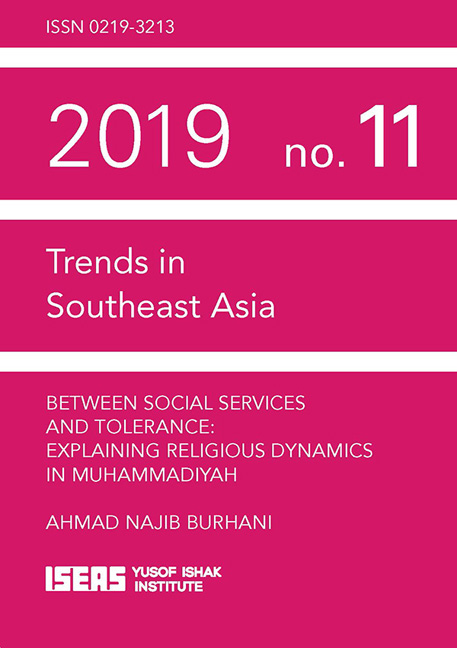Between Social Services and Tolerance: Explaining Religious Dynamics in Muhammadiyah
Published online by Cambridge University Press: 25 January 2020
Summary
INTRODUCTION
Alongside Nahdlatul Ulama (NU), Muhammadiyah is often seen as one of the two pillars of moderate Islam in Indonesia. It is commonly believed that these two largest Muslim organizations have contributed much towards stabilizing and balancing democracy after Reformasi—the Indonesian Spring of 1998—happened, and that it is partly because of these two organizations that civil Islam has been flourishing in the country.
Because of this, the two organizations are often expected to stand together on most issues. In recent times, however, leaders of these two organizations have appeared to be in different camps. Public statements by them attest to this, particularly on three issues: The banning of the Hizbut Tahrir Indonesia (HTI), the recurrent controversy about the Indonesian Communist Party (PKI), and the ruling of the Constitutional Court on Penghayat Kepercayaan. They even seemed to be pitted against each other during the religious gatherings in Garut, Karanganyar, and Sukoharjo where Ustadz Bachtiar Nasir and Felix Siauw were the main speakers; while the NU tried to stop these speakers, Muhammadiyah was protective of them.
This article analyses Muhammadiyah's response to Aksi Bela Islam, and the three abovementioned religious controversies. Why has this organization appeared to be closer to and to have shown more affinity towards Islamist groups than to NU? Has there been any ideological shift or change in Muhammadiyah? Do old designations such as modernist, puritan, and reformist Islam, still reflect its religious position? This article provides an overview of, firstly, the historically undisputed concern of Muhammadiyah with social services, and secondly, the organization's cultural transformation since the Congress in Aceh 1995, and thirdly, Muhammadiyah's responses on religious issues in 2017.
SOCIAL SERVICES AS MUHAMMADIYAH'S IDEOLOGY
Muhammadiyah has been labelled in a variety of ways, the most popular being modernist, reformist, and puritan Islamist. Be that as it may, the organization is fundamentally a social movement, with social services activities having been one of its most important aspects since its establishment in 1912. The social services provided by most of its branches throughout Indonesia are mostly in education, in helping orphans, and in health matters.
- Type
- Chapter
- Information
- Between Social Services and Tolerance , pp. 1 - 23Publisher: ISEAS–Yusof Ishak InstitutePrint publication year: 2019



